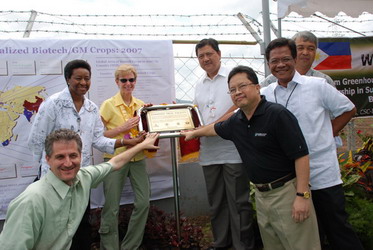
US Ambassador Visits Biotech Eggplant and Papaya Confined Trial Sites in the Philippines
March 14, 2008| |
United States Ambassador to the Philippines Kristie Kenney visited the confined trial site of the public-sector developed biotech eggplant and papaya in the campus of the University of the Philippines Los Banos (UPLB). The unveiling of a site marker on the confined trial facility highlighted the activity on March 10, 2008 to commemorate the progress achieved in US-Philippine partnership on biotech crop R&D. The confined trials are being conducted to obtain horticultural data and perform breeding and line selection activities on the fruit and shoot borer resistant (FSBR) eggplant and the papaya ringspot virus resistant (PRSV-R) papaya being developed by the UPLB-Institute of Plant Breeding before these crops are advanced to multi-location trials.
During the program, Ambassador Kenney said that she was very happy that the contributions from the American people went a long way and helped in the research and development of the two biotech crops and added that she believes that the crops would significantly impact small farmers in the Philippines.
The activity was also attended by USAID (Philippines) Deputy Director Elzadia Washington, USAID Chief of Energy and Environment Office Daniel Moore and by representatives from USDA-Foreign Agricultural Service (FAS) as well as UPLB's partner institutions including the International Service for the Acquisition of Agri-biotech Applications (ISAAA), Agricultural Biotechnology Support II Project (ABSPII), Philippine Council for Agriculture, Forestry and Natural Resources Research and Development (PCARRD), Southeast Asian Regional Center for Graduate Study and Research in Agriculture (SEARCA), and various government regulatory agencies.

(L-R) USAID’s Daniel Moore and Elzadia Washington, Ambassador Kristie Kenney, UPLB Chancellor Luis Rey Velasco, PCARRD Executive Director Patricio Faylon, ISAAA Global Coordinator Randy Hautea and IPB Director Jose Hernandez Jr.
| |
Biotech Updates is a weekly newsletter of ISAAA, a not-for-profit organization. It is distributed for free to over 22,000 subscribers worldwide to inform them about the key developments in biosciences, especially in biotechnology. Your support will help us in our mission to feed the world with knowledge. You can help by donating as little as $10.
-
See more articles:
-
News from Around the World
- The African Biotech Plan
- New Propagation Techniques Boost Ghana Banana-Plantain Production
- Scientists Identify Gene that Controls Fruit Shape
- The Power of Two… Insecticidal Proteins
- Signaling Pathway May Lead to Better Biofuel Sources
- Glyphosate-Resistant Johnson Grass Confirmed in Two Locations
- US$6 Million Research Lab for Ethanol and Other Biofuels from Grasses and Biomass
- UM Invention Promises Major Advance in Biofuel Production
- US Ambassador Visits Biotech Eggplant and Papaya Confined Trial Sites in the Philippines
- China Joins Network of Biotech Info Centers
- Indonesia Develops a Biotech Drought Tolerant Rice
- UK Consumers are Less Concerned About GM Food Ingredients
- EU Delays GM Potato Approval
- HARDY Rice for Marginal Soils
- The Role of Animal Feeding Trial in GM Food Safety and Nutritional Assessment
- Sugar Cane and Sorghum: Two Very Similar Genomes
- Parameters Affecting Gene Flow in Oilseed Rape
-
Research Highlights
- GM Tomato Producing Functional Human Antitrypsin
- Recent Approaches in Developing Insect 'Proof' Plants
- GM Strawberries Tolerant to Salt Stress
-
From the BICs
- Bangladeshi Journalists and Scientists Discuss Global Status of GM Crops
-
Announcements
- GMO Detection, Identification and Quantification Training Course
- Rate the CBU Articles!
-
Read the latest: - Biotech Updates (January 14, 2026)
- Gene Editing Supplement (December 17, 2025)
- Gene Drive Supplement (February 22, 2023)
-
Subscribe to BU: - Share
- Tweet
